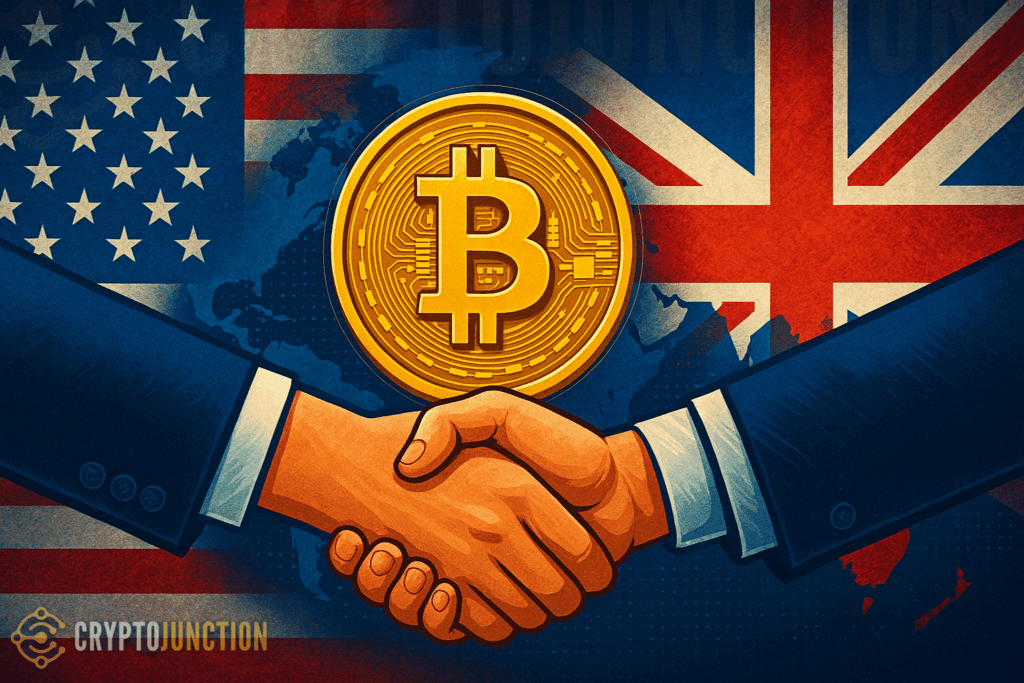The global financial world just received its biggest plot twist yet. To tackle these changes effectively, a Transatlantic Taskforce has been formed. Two of the most powerful economies, often rivals in financial influence, have decided to lock arms and march into the uncharted territory of cryptocurrency. It feels like a movie script brought to life, but this time the storyline is real. The move could reshape how digital assets are regulated, traded, and trusted for decades to come.
The announcement introduces a mysterious new alliance with significant weight. The United States and the United Kingdom are not merely observing crypto’s rise; they are preparing to shape its future with a transatlantic effort, further solidifying the purpose of this Transatlantic Taskforce.
A Task Force That Could Change Everything
The Transatlantic Taskforce for the Markets of the Future is far from symbolic. Spearheaded by U.S. Treasury Secretary Scott Bessent and U.K. Chancellor Rachel Reeves, the initiative comes with urgency. The mission is clear: deliver a detailed report within 180 days containing concrete policy recommendations for digital assets.
The scope of the project extends beyond short-term analysis. It will explore near-term collaboration and long-term strategies for financial innovation, ensuring regulators do not leave crypto in limbo.
Industry giants are already involved. Coinbase, Circle, Ripple, Barclays, Citi, and Bank of America have seats at the table. Both governments emphasized that recommendations will be crafted “in close collaboration with industry partners,” signaling a commitment to balance regulation with innovation. This approach marks a significant shift from the fragmented and often confusing oversight seen in recent years.
Why This Matters More Than You Think
At first glance, the creation of a task force may sound routine. But this initiative represents a historic turning point in the way global finance approaches crypto. Until now, the U.S. and U.K. have frequently acted in isolation, often producing conflicting signals for innovators and investors. However, as part of a unified Transatlantic Taskforce, their collaborative efforts could turn the tide in global regulation.
By uniting, the two governments are laying the foundation for regulatory harmonization. This means fewer barriers for startups scaling across borders, smoother capital flows, and safer markets for investors. The message is simple: digital assets deserve a framework that allows innovation to flourish while maintaining financial stability.
Industry leaders quickly recognized the impact. Dante Disparte, Circle’s chief strategy officer, described the task force as a “pivotal step forward,” emphasizing the global opportunities it could unlock for investors and businesses. Coinbase’s Daniel Seifert praised the initiative as a chance to generate “deeper liquidity, broader financial participation, and new capital for businesses.”
The broader implication is clear. This task force is not just producing paperwork; it is paving the way for a new financial era.
The Twist No One Saw Coming
The true surprise lies in what this partnership signals. This could become the first domino in a series of global alignments on crypto regulation. As part of the Transatlantic Taskforce, a successful U.S.-U.K. framework may inspire other major economies to follow, creating momentum for a more unified international approach.
The collaboration sends a powerful message to regulators around the world: the era of fragmented, inconsistent oversight is fading. What was once dismissed as a passing trend or too risky to control is now receiving the direct attention of two of the most influential financial powers.
Crypto is no longer an outsider in the halls of legitimacy. With backing from the U.S. Treasury and the U.K. Treasury, digital assets are stepping firmly into the global financial spotlight.
Final Thoughts
The creation of the U.S.-U.K. crypto task force is about more than regulation. It represents a deliberate effort to build trust, drive innovation, and recalibrate the balance of power in global finance. For the first time, governments and industry leaders are not simply reacting to crypto’s rise, they are actively shaping its trajectory as part of a broader Transatlantic Taskforce initiative.
In six months, the report from this task force could redefine how investors, startups, and global businesses engage with digital markets. The suspense lies not in whether change will come, but in how profound that change will be.

